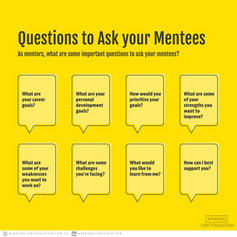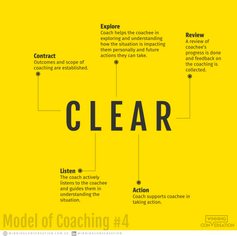Coaching & Mentoring for Performance
Knowledge and skills needed to maintain and/or develop the performance of your team effectively.

BACKGROUND
The arts of coaching and mentoring transform performance measurement into performance management and development. While the benefits of both in regard to employee experience, engagement, retention, and performance have been proven across theoretical experiments and practical case studies, research shows that there is a severe lack of it. Without appropriate guidance on how to improve performance, performance reviews can leave people feeling trapped and lost with no way out.
As we move away from a time where managers manage their subordinates to a time where employees are collaborating with their managers to achieve their goals, resolving this challenge is more important now than ever.
To that end, we’ve designed this program to equip leaders playing the roles of coaches and mentors, with the necessary knowledge and skills to effectively support their teams intellectually and emotionally to achieve their goals.
Keep reading to learn more about what the participants will be able to do at the end of the session.
OBJECTIVES
By the end of the program, participants will learn how to:
-
Appreciate and differentiate coaching and mentoring
-
Understand and apply the models and common obstacles of coaching and mentoring
-
Uncover what motivates people to perform and what keeps them from performing
-
Actively listen and openly communicate with your employee to understand their goals, their challenges, their strengths and weaknesses.
-
Motivate, foster accountability in and emotionally support the coachee/mentee
-
Set up a relationship for success – trust, rapport, expectations and a development plan
-
Keep ongoing communication with coachee/mentee without under/overwhelming them
-
Support coachees/mentees through problems
-
Balance recognition and constructive feedback
-
Discussing action plans and solutions to improve performance
-
Relate people skills to the structure of a coaching or mentorship program
Keep reading for the kind of content we’re going to share to achieve these objectives.
CONTENT
Module 01: Introduction
-
Defining Coaching & Mentoring
-
What is the role of a coach and a mentor?
-
What are their similarities and differences?
-
How do they relate to performance?
Module 02: The Fundamentals
-
Uncovering key motivators & techniques to motivate
-
Discovering The Inner Game
-
Understanding Barriers to High performance
-
Techniques to apply emotional intelligence
-
Techniques of active listening
-
Techniques to fostering accountability
Module 03: Establishing a Relationship
-
Tools to build rapport & establish trust
-
Understanding the Coachee/Mentee (What drives them? What kind of person are they? What are they driven by? What are their strengths and weaknesses?)
-
Discussing expectations (What do you expect of one another?)
-
Discussing a game plan (How have they performed in the past? How do they hope to perform from now?)
Roleplay Session 1
Module 04: Maintaining On-going Communications
-
Designing a Communications “Plan” (Answering when to check in, how often, which channels to use and when to use them and what to discuss)
-
Incorporating objective questions to better understand them and their progress
-
Incorporating stories and anecdotes to motivate and build relationships
Roleplay Session 2
Module 05: Recognition & Constructive Feedback
-
Understanding the importance and benefits of appreciations
-
Techniques to give authentic praise
-
Structures on how to give constructive criticisms
Module 06: Discussing Action Plans
-
Encouraging and facilitating reflection on and self-evaluation of performance
-
Unpacking problems and challenges faced by coachee/mentee and guiding them in problem solving
-
Discussing action plans and revising goals
Roleplay Session 3
Module 07: Coaching Specific
-
Assessing Learning Styles
-
Introduction to the GROW Model
-
Goals: Asking “What do you want?”, Reality: Discussing “Where are they now?”, Options: Assessing “What can be done?”, Will: Finalising “What they will do?”
-
-
Common obstacles to Coaching
-
Kolb’s Learning Cycle
Roleplay Session 4
Module 08: Mentoring Specific
-
Introducing the 4 stages of Mentoring
-
Initiating: Forming rapport with, understanding goals of and discussing expectations with mentee; Cultivating: On going interactions with the mentee; Separating: Recognising the ending of the relationship, reflection and “graduation”l Redefining: Transitioning from a mentor-mentee relationship into a peer-like relationship
-
-
Useful concepts to share with mentees
-
Common obstacles to Mentoring
Bringing it all Together
Roleplay Session 5
TARGET AUDIENCE
For individuals who manage the performance and development of others:
-
Department Heads/Direct Reports
-
Team Leads
-
Managers
-
Supervisors
MEDIUM/LEARNING TOOLS
-
Seminar or Lecture styled Explanation of Concepts
-
Questions to facilitate discussions and reflection
-
Role-play of common scenarios to facilitate experiential learning
FORMATS/PACKAGES
*Custom Packages can be designed upon request.
2 DAY TRAINING
All Content
6 - 8 hours
Maximum 20
1 DAY TRAINING
COACHING
Selected Content
Custom
1 - 3 hours
Custom
Maximum 20
Maximum 6
Request Quote
PACKAGES*
CONTENT
ROLEPLAY
PAX/SESSION
COST
SKILLS
-
Coaching Skills
-
Mentoring Skills
-
Leadership Skills
-
Performance Management
















